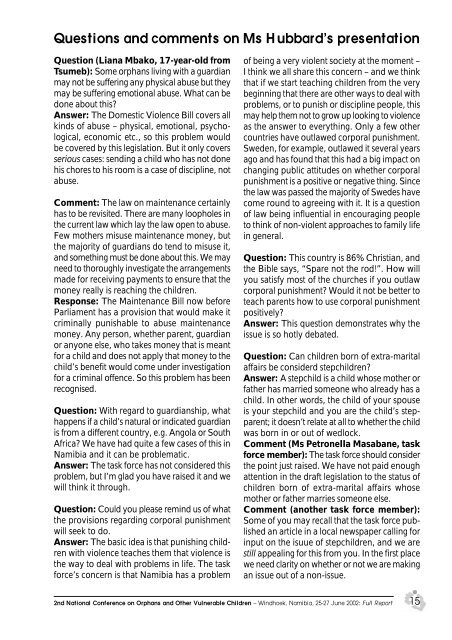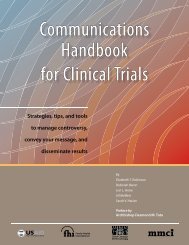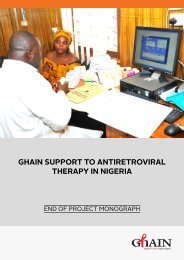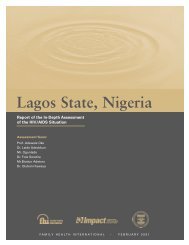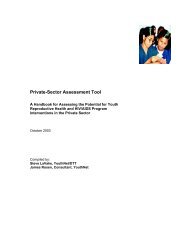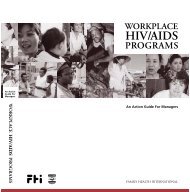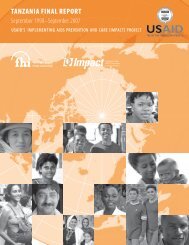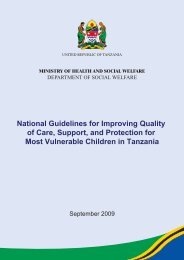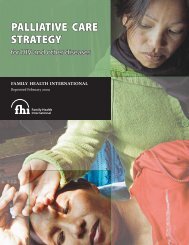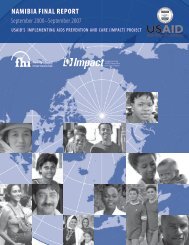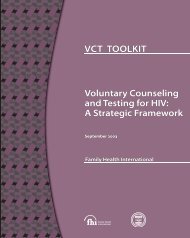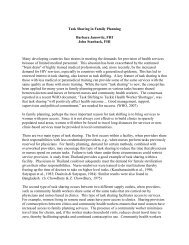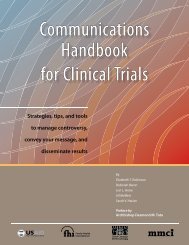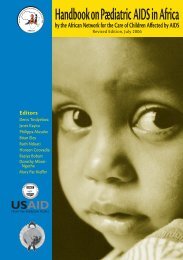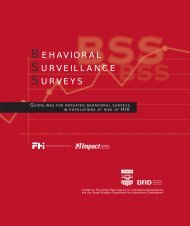2nd National Conference on Orphans and Other ... - FHI 360
2nd National Conference on Orphans and Other ... - FHI 360
2nd National Conference on Orphans and Other ... - FHI 360
You also want an ePaper? Increase the reach of your titles
YUMPU automatically turns print PDFs into web optimized ePapers that Google loves.
Questi<strong>on</strong>s <strong>and</strong> comments <strong>on</strong> Ms Hubbard’s presentati<strong>on</strong><br />
Questi<strong>on</strong> (Liana Mbako, 17-year-old from<br />
Tsumeb): Some orphans living with a guardian<br />
may not be suffering any physical abuse but they<br />
may be suffering emoti<strong>on</strong>al abuse. What can be<br />
d<strong>on</strong>e about this?<br />
Answer: The Domestic Violence Bill covers all<br />
kinds of abuse – physical, emoti<strong>on</strong>al, psychological,<br />
ec<strong>on</strong>omic etc., so this problem would<br />
be covered by this legislati<strong>on</strong>. But it <strong>on</strong>ly covers<br />
serious cases: sending a child who has not d<strong>on</strong>e<br />
his chores to his room is a case of discipline, not<br />
abuse.<br />
Comment: The law <strong>on</strong> maintenance certainly<br />
has to be revisited. There are many loopholes in<br />
the current law which lay the law open to abuse.<br />
Few mothers misuse maintenance m<strong>on</strong>ey, but<br />
the majority of guardians do tend to misuse it,<br />
<strong>and</strong> something must be d<strong>on</strong>e about this. We may<br />
need to thoroughly investigate the arrangements<br />
made for receiving payments to ensure that the<br />
m<strong>on</strong>ey really is reaching the children.<br />
Resp<strong>on</strong>se: The Maintenance Bill now before<br />
Parliament has a provisi<strong>on</strong> that would make it<br />
criminally punishable to abuse maintenance<br />
m<strong>on</strong>ey. Any pers<strong>on</strong>, whether parent, guardian<br />
or any<strong>on</strong>e else, who takes m<strong>on</strong>ey that is meant<br />
for a child <strong>and</strong> does not apply that m<strong>on</strong>ey to the<br />
child’s benefit would come under investigati<strong>on</strong><br />
for a criminal offence. So this problem has been<br />
recognised.<br />
Questi<strong>on</strong>: With regard to guardianship, what<br />
happens if a child’s natural or indicated guardian<br />
is from a different country, e.g. Angola or South<br />
Africa? We have had quite a few cases of this in<br />
Namibia <strong>and</strong> it can be problematic.<br />
Answer: The task force has not c<strong>on</strong>sidered this<br />
problem, but I’m glad you have raised it <strong>and</strong> we<br />
will think it through.<br />
Questi<strong>on</strong>: Could you please remind us of what<br />
the provisi<strong>on</strong>s regarding corporal punishment<br />
will seek to do.<br />
Answer: The basic idea is that punishing children<br />
with violence teaches them that violence is<br />
the way to deal with problems in life. The task<br />
force’s c<strong>on</strong>cern is that Namibia has a problem<br />
of being a very violent society at the moment –<br />
I think we all share this c<strong>on</strong>cern – <strong>and</strong> we think<br />
that if we start teaching children from the very<br />
beginning that there are other ways to deal with<br />
problems, or to punish or discipline people, this<br />
may help them not to grow up looking to violence<br />
as the answer to everything. Only a few other<br />
countries have outlawed corporal punishment.<br />
Sweden, for example, outlawed it several years<br />
ago <strong>and</strong> has found that this had a big impact <strong>on</strong><br />
changing public attitudes <strong>on</strong> whether corporal<br />
punishment is a positive or negative thing. Since<br />
the law was passed the majority of Swedes have<br />
come round to agreeing with it. It is a questi<strong>on</strong><br />
of law being influential in encouraging people<br />
to think of n<strong>on</strong>-violent approaches to family life<br />
in general.<br />
Questi<strong>on</strong>: This country is 86% Christian, <strong>and</strong><br />
the Bible says, “Spare not the rod!”. How will<br />
you satisfy most of the churches if you outlaw<br />
corporal punishment? Would it not be better to<br />
teach parents how to use corporal punishment<br />
positively?<br />
Answer: This questi<strong>on</strong> dem<strong>on</strong>strates why the<br />
issue is so hotly debated.<br />
Questi<strong>on</strong>: Can children born of extra-marital<br />
affairs be c<strong>on</strong>siderd stepchildren?<br />
Answer: A stepchild is a child whose mother or<br />
father has married some<strong>on</strong>e who already has a<br />
child. In other words, the child of your spouse<br />
is your stepchild <strong>and</strong> you are the child’s stepparent;<br />
it doesn’t relate at all to whether the child<br />
was born in or out of wedlock.<br />
Comment (Ms Petr<strong>on</strong>ella Masabane, task<br />
force member): The task force should c<strong>on</strong>sider<br />
the point just raised. We have not paid enough<br />
attenti<strong>on</strong> in the draft legislati<strong>on</strong> to the status of<br />
children born of extra-marital affairs whose<br />
mother or father marries some<strong>on</strong>e else.<br />
Comment (another task force member):<br />
Some of you may recall that the task force published<br />
an article in a local newspaper calling for<br />
input <strong>on</strong> the isuue of stepchildren, <strong>and</strong> we are<br />
still appealing for this from you. In the first place<br />
we need clarity <strong>on</strong> whether or not we are making<br />
an issue out of a n<strong>on</strong>-issue.<br />
<str<strong>on</strong>g>2nd</str<strong>on</strong>g> <str<strong>on</strong>g>Nati<strong>on</strong>al</str<strong>on</strong>g> <str<strong>on</strong>g>C<strong>on</strong>ference</str<strong>on</strong>g> <strong>on</strong> <strong>Orphans</strong> <strong>and</strong> <strong>Other</strong> Vulnerable Children – Windhoek, Namibia, 25-27 June 2002: Full Report<br />
15


